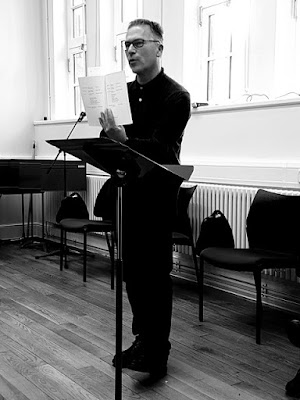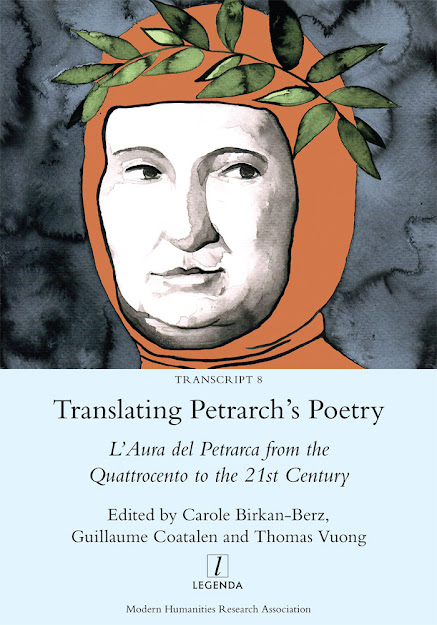I have begun to write what I call 'contrafacts and counterfactuals' to some sonnets of Keats. This post (or rather posts) tells the story of how I began that task, and I also describe the larger project, the 'English Strain project', to which it belongs. This is an attempt at an overdub, an understudy, a version, of Keat’s
most famous sonnet, which is first, rejected, then rescued, and amended. Thus:
On Looking Again into Peter
Hughes’s Petrarch (draft)
I’ve travelled a lot in Norfolk; I’ve seen
toffs with their guns eating their own packed lunches
in the pubs; bitten by the snippy crabs of Cromer
and the nippy Arctic winds of King’s Lynn; I’ve seen
threadbare Teddy Boys in Norwich Market (1975);
but never did I find a tattered fairground
blaring Stupid Cupid through a distorted tannoy
till I heard sly-eyed Hughes loud and clear; and I felt
like a consultant consulting the world’s worst piles;
or like watching Eric Morecambe on the telly
with his trembling glasses, stretching over a fence
on little un-Grecian Ern’s shoulders: and I’d hoot
at Eric’s wide-eyed speechless leer, as he beheld
unseen teams of nudists bouncing their balls.
20th August 2020
I wrote this poem on auto-pilot. The lines came to me
and I saw the poem and its effects laid out before me as though it had already
been written. In some senses it had: it transfers to Keats’ ‘On First Looking
into Chapman’s Homer’, the technique of much of ‘The English Strain’ project (versions
of canonical sonnets) and it returns me to the poetics of ‘Petrarch 3’, the first
part, which arose out of some literary critical writing I was doing on Peter’s ‘Petrarch’
(and Tim Atkins’ too; see here: https://robertsheppard.blogspot.com/2013/12/robert-sheppard-on-petrarch-boys-peter.html). I like the poem but, like Roy Fisher, I distrust the
poem in its (apparent) hour of success. Hadn’t my ghostly production of ‘Ozymandias’
turned the project (as though it itself was an enormous sonnet corona)
so that it could not turn back to this sort of thing? Yes. I’d already decided
that. I’d been looking at some poems of Robert Duncan, ‘derivative’ (his word)
of Dante’s sonnets, which weren’t sonnets at all. (I mean they possessed none of
the determinants of sonnethood; not even 14 lines.) And that throws it open to
respond to a selection of Keats’ sonnets in an original way (possibly under the
title ‘Weird Syrup’), vaguely thinking ahead to John Clare’s sonnets (which I am
thinking of transposing into quennets) and the end of this project. In other words, to leave the hitherto
guiding formal constraint (what’s left of it) behind. ‘14 Standards’ had me
exercising my formal muscle, so that each poem was a different sonnety shape. And
I’d almost left the Brexit theme, with its National Dogging Sites, behind with
Wordsworth, up his knees in Kentish fluid!
In short, I have developed a ‘technique’, a mode, that
can take any sonnet by any writer, and transpose it (even here, where there is
no approach to Brexit or Coronavirus). I am not programmatically wedded to formal
innovation or investigation, but I need to prefer my will to my ease here, and push
on, investigatively, formally. I have 14 sonnets by Keats selected, or randomly arranged
(there are, oddly, 14 sonnets embedded in the selection of Keats’ letters, in Gittings’
edition), and ‘Chapman’s Homer’ isn’t one of them. I point you also to Robert
Hampson’s work on that sonnet. Of course, I could use it alone as a
model for 14 poems, replicating the work of ‘Petrarch 14’, but that seems
inadequate, though suggestive! (On Looking Again into Tim Atkins’ Petrarch; On
Looking Again into Petrarch’s Petrarch; On Listening Again to Dusty Springfield;
On First Listening to Harish Raghavan’s Calls to Action; On Looking
Again into the Shed at the bottom of the garden; On Looking Again at Boris
Johnson’s Brexit; On Looking Again into the Dominic Cummings’ Eyesight; On
Looking into Trump’s Tax Records…) In an Oulipean way it is, as it should be, potentially
(I typed ‘poetentially’) plenitudinous. But I’ve three volumes of this
stuff anyway (that’s over 200 poems!) and it needs to turn away from former
models, but perhaps back towards contemporary political and social events. (The
slippage back to the 1970s, as here, is there in ‘Petrarch 3’, in my versions
of Charlotte Smith’s Sussex sonnets, and in one of the Wordsworth overdubs. That mention
of ‘former models’ sounds coincidentally slightly sleazy!)
I think I shall have my cake and eat it (why not? It’s
a very Brexity concept, as earlier poems suggested, where I used that as a title) as I have by turning ‘Ozymandias’
into a ghost of itself (and by offering my 2007 version of it, ‘for Stephen’,
as an extra, in the notes to the notes). I might print this new poem as a footnote
to my Keats variations, a phantom limb (rather than Keats’ ‘living hand’) sticking
out and providing fake sensations, a false reading on the poetentiometer!
UPDATE (two days later): Then this happened. As I was
revising the half-abandoned poem, I half rescued it, as I continued to work on
it, and ended up with (again) partly: a poem that looks remarkably like what I
was intending to do: a poem coming out of a sonnet, which is not itself a
sonnet. I also explicitly added a Brexit theme. (Upupdate: these posts are usually temporary, so while I am keeping the body of this post, I have removed the poem, which, formally speaking is 14 set of couplets. I read the revised version on the video, though. It is still called
On Looking Again into Peter
Hughes’s Petrarch
I’ve travelled a lot in North
Norfolk too etc etc
20th-22nd August 2020
The poem is not only set in the territory featured in Peter’s poems (which I did know, and travel a lot in, during my UEA 1970s and early 80s); it is also the site of a spectacular local vote for Brexit. So formally and thematically, this version is tougher, and
belongs to
British Standards, which is the working title of the part of the project to which these 'Weird Syrup' are planned, although it does dislodge the plans I’d devised for tackling Keats. Critics writing about Keats (because they don’t understand the nature of poetics as an anticipatory writerly discourse) are surprised that his letters indicate, for example, that one day he renounces writing epic, and the next day he takes it up again, but in a different way. I understand that. And I understand that writing what I wrote (above) and what I’m writing now, is part of the process. As is the blogging of these drafts each time. (It is not just because the poems are generally topical, but it is a part of the ritual of producing them. It is, we could say, part of the writing.)
As I worked on the poem (and perchance into my hands came a CD with Stupid Cupid on it, I mean, literally, without me remembering that a man in a pub had once burnt it for me, there it was in a pile while I was searching for Tori Freestone or Ambrose Akimusire!) I wondered whether Keats and his sonnets might entirely defeat me, that I might be only able to this one. What a spur to do them – or to do something different! (23rd August 2020)
This is a hub post for ALL of my versions of Keats (You can see that I was able to accmplish 14 of them!) Pages: Weird Syrup: The final Keats variation: a (premature) farewell to satire as a strand in British Standards (temporary post with video) (robertsheppard.blogspot.com)
The book I am thinking of calling British
Standards was
begun in 2020, after Brexit Independence Day; the first section was finished
late March. For its first section, I transposed poems from part of Wordsworth’s
‘Poems Dedicated to National Independence and Liberty’,
and retitled them ‘Poems of National Independence’, and even more cheekily subtitled
them, ‘liberties with Wordsworth’. I write about that sequence here: https://robertsheppard.blogspot.com/2020/03/the-last-of-my-wordsworth-versions-in.html
Then
followed ‘14 Standards’, and in turn, two additional ‘Double Standards’ about
the Cum’s disgraceful lockdown infringements, and his elitist refusal of
apology and regret. See here for information on all 16 ‘standards’: http://robertsheppard.blogspot.com/2020/05/robert-sheppard-14-standards-from.html
. There are links to online publication of some of the poems too.
I’ve documented
‘The English Strain’ project as work progressed through its three books so far.
There are two comprehensive posts to check out, one that looks at Book One, The English Strain here and another at Book Two, Bad Idea here . (The final part of Bad Idea is slightly
different; called ‘Idea’s Mirror’, it’s described here: https://robertsheppard.blogspot.com/2019/12/my-last-ideas-mirror-post-election-poem.html
)
Book
One of ‘The English Strain’ project, The English Strain, is available
from Shearsman Books here:
https://www.shearsman.com/store/Sheppard-Robert-c28271934?offset=6
Book
Two, Bad Idea is available from Knives Forks and Spoons, HERE: https://www.knivesforksandspoonspress.co.uk/product-page/bad-idea-by-robert-sheppard-102-pages
Meanwhile parts of
Book One are still available in booklet form; look here for Petrarch 3, which is also co-dedicated to Peter Hughes (for it was partly his work that got this whole project going) in its fold-out map format, and here for Hap:
https://www.knivesforksandspoonspress.co.uk/product-page/hap-understudies-of-thomas-wyatt-s-petrarch-by-robert-sheppard-26-page
As might
be gathered from what I have said, British Standards as a whole (not
just the corona of ‘14 Standards’) aims to present transpositions of admired sonnets
of the Romantic period, from William Bowles to Dante Gabriel Rossetti, stopping off at Keats on the way. Chronologically,
they lie between those of Charlotte Smith, which I’ve already worked on
here, https://robertsheppard.blogspot.com/2019/07/more-english-strain-poems-overdubs-of.html
and those
of Elizabeth Barrett Browning, that I’ve also worked on, both of them in the
final parts of Book One:
http://robertsheppard.blogspot.com/2018/09/robert-sheppard-non-disclosure.html




























